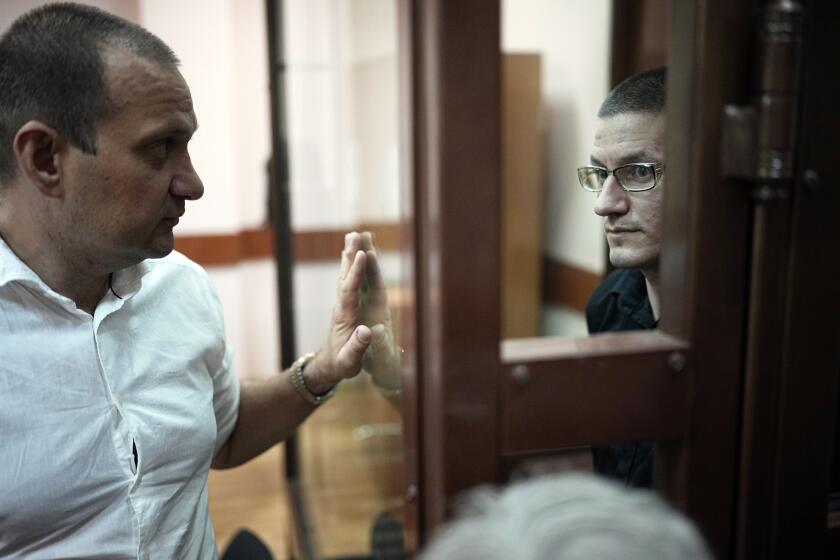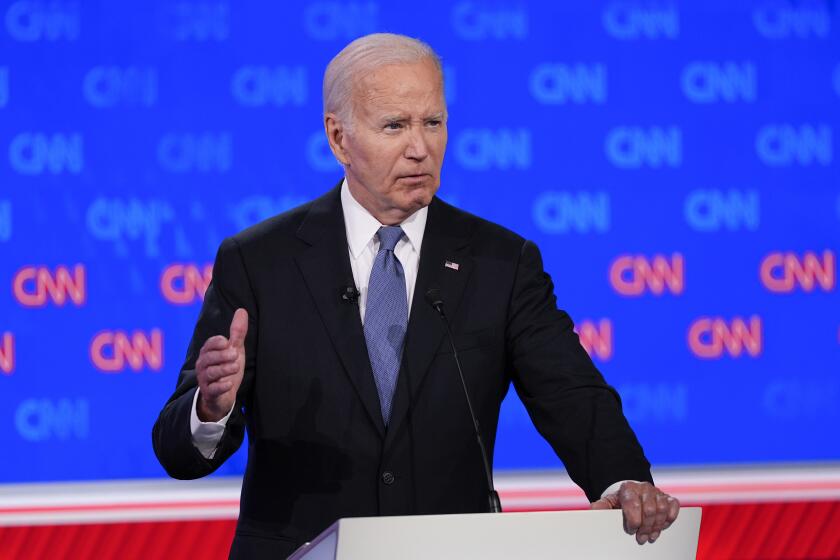N. Y. Police Chief Resigns Amid Probe : Commissioner: The head of the 29,000-member force cites ‘personal reasons,’ and not a dispute with the mayor over a review panel.
Police Commissioner Lee P. Brown, who has locked horns with Mayor David N. Dinkins in recent weeks over Dinkins’ appointment of an independent panel to investigate alleged corruption in the nation’s largest police department, announced his resignation Monday.
But the 55-year-old police commissioner, the first black ever to head New York’s 29,000-member police force, cited “personal and not professional reasons” for his decision.
In a joint news conference with the mayor at City Hall, Brown said that he was resigning Sept. 1 to care for his wife, who is ill, and to return to his family in Houston, where he has accepted a college teaching job.
“There’s only one reason I’m making this decision. My family comes first,” Brown said. The particular illness of his wife, Yvonne, was not disclosed.
The mayor also announced that David W. Scott, Brown’s chief of department and the highest-ranking uniformed police officer, is retiring from the force after 30 years. Scott, 57, cited his own personal health reasons and said that his departure is not connected with Brown’s.
Dinkins named First Deputy Police Commissioner Raymond Kelly, a 29-year veteran of the department, as acting commissioner until a replacement for Brown can be found.
Gov. Mario M. Cuomo said that he was surprised by Brown’s resignation and called him “one of the best police commissioners in the country.”
Det. Robert Rivers Jr., president of the Guardians Assn., an organization of black police officers, added that Brown will be sorely missed in the department. “I don’t know where we’re going from here,” he said. “I hope it’s not backwards.”
Brown, who headed the Houston Police Department before taking over as New York’s 36th police commissioner in January, 1990, has earned high marks for implementing a community policing program that has quadrupled the number of police officers on foot patrol and that seeks to create a crime-fighting partnership between police and citizens.
The number of reported crimes in the city fell by 6.7% in the first four months of this year compared to the same period last year, continuing a trend widely attributed to the presence of more officers on the streets.
“I don’t think we would have had the community policing program without Lee Brown, and I’m sorry he won’t be around to see it hit full stride,” said Thomas Repetto, head of the Citizens Crime Commission, after learning of Brown’s resignation.
In recent months, however, the police department has been scandalized by allegations of widespread drug dealing and corruption. Five officers have been arrested and charged with buying cocaine while in uniform and accepting bribes from drug-dealing gangs. Questions multiplied about the effectiveness of the department’s internal affairs division in ferreting out police wrongdoing.
In late June, the mayor appointed an independent five-member panel to investigate the allegations of corruption within the police department and called on the City Council to approve the creation of an all-civilian review board to monitor charges of police brutality.
Brown strongly opposed both moves, calling the independent corruption investigation unnecessary and saying that he has never seen an external review board that worked in his 36 years of policing.
The panel that Dinkins named to investigate police corruption represents the most extensive outside investigation of the department since the celebrated Knapp Commission in the 1970s. Milton Mollen, the mayor’s friend and former deputy mayor for public safety, was named to head the panel.
But at the news conference to announce his resignation, Brown denied any professional conflict with Dinkins.
“I’m leaving New York for personal and not professional reasons,” said Brown, who was appointed to his post by Dinkins. “I had what I consider to be the greatest and best policing job anyplace in the world.”
The commissioner, who holds both a master’s degree and doctorate in criminal justice, said that he had accepted a teaching job at Texas Southern University.
Brown was effusive in his praise for the mayor’s “Safe Street, Safe City” comprehensive crime control program, which has boosted the number of officers on foot patrol to 3,000 from 750.
“Crime in many parts of the country is going up, but in New York . . . it was down at the end of last year in every category for the first time in some 36 years,” he said.
Dinkins, in his letter accepting Brown’s resignation, praised Brown as “the best police commissioner to be found anywhere in this country or, for that matter, in the world.”
More to Read
Start your day right
Sign up for Essential California for news, features and recommendations from the L.A. Times and beyond in your inbox six days a week.
You may occasionally receive promotional content from the Los Angeles Times.






